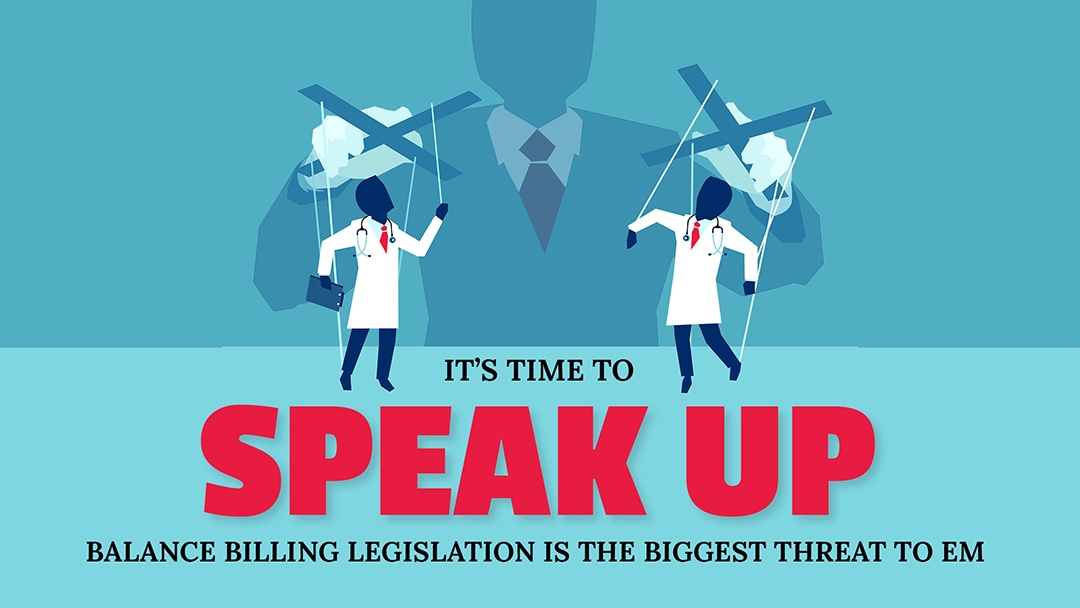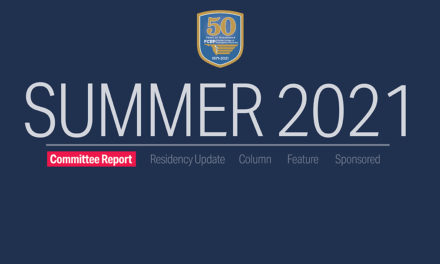Fall 2019: Gov Affairs: It’s Time to Speak Up
It’s time to speak up. Balance billing legislation is the biggest threat to emergency medicine.
Imagine if someone told you certain groups were lobbying in Washington D.C. to cut your salary 30-40% in order to pad health insurance company income statements. Would it motivate you to do something to stop it?
In an effort to end balance billing (now called “surprise billing”), Congress is currently working on this exact scenario by proposing legislation that would let health insurance companies “benchmark” out-of-network (OON) bills at 125% of their median in-network rates. In June, the Senate HELP Committee was ready to rubberstamp a plan that would have placed a price ceiling fee-schedule on OON charges. This essentially would max out all emergency physician reimbursement at median levels provided by insurance companies.
The Congressional Budget Office estimates this would lead to 20% pay-cuts to hospital-based “PEAR” physicians (pathology, EM, anesthesia, radiology) over the next 10 years. Given EM physicians’ reliance on commercial payors to offset non-reimbursing, uninsured EMTALA care, ACEP estimates the revenue cuts for EM physicians—after insurers undoubtedly renegotiate current in-network contracts—would be closer to 30-40%. This is essentially SGR Armageddon 2.0, this time targeting PEAR physicians.
Fortunately, through the efforts of nationally organized medicine groups such as ACEP and grassroots efforts by individual doctors linked through emails and social media, we were able to hold off a final vote in the Senate. Further, on the House side, thanks to fellow emergency physician and Congressman Raul Ruiz (D–CA), we were able to get the House to approve an amendment on HR 3630 (Pallone, No Surprises ACT), which uses an Individual Dispute Resolution (IDR) as a way of settling OON rates. This solution will be much less disruptive to our practices and will allow some form of negotiation between EM physicians and insurance companies without drastically cutting our reimbursement. Senator Dr. Cassidy (R–LA, a gastroenterologist) is working on an amendment that would add IDR to the Senate surprise-billing bill S.1895 mentioned above, making it much more fair to physicians.
We are being told that Congress will definitely pass something this year that will end balance billing. The method they choose will have enormous ramifications affecting our practice for years to come. This is currently our biggest threat in EM. We need all EM physicians in Florida to come together now to pressure local representatives, as well as Senators Scott and Rubio, to make sure the right solution to end surprise billing is chosen.
We need local doctors calling or emailing their legislators. The short version is we need them to co-sponsor or vote in favor of an IDP solution on the House side, and add the Cassidy workgroup amendment (S. 1531) on the Senate side. We need to absolutely oppose benchmarking, which will unilaterally favor insurance companies and gut EM reimbursement. Further, the threshold at which one can use IDP is currently set at $1250. This is too high to benefit emergency physicians, most of whom have bills of around $500-600 for lifesaving work. We need a reasonable threshold (or ability to batch claims) in order to ensure insurers don’t abuse federal law like they have with the Florida Balance Billing law. Constituent voices tend to matter more than other calls/emails, so we need all members calling or emailing their representatives.
At the end are resources to educate your fellow physicians on where we stand. Please reach out to your groups to have your local physicians contact their legislators. You can also help by emailing your group information and being a voice for physicians on social media. This issue affects more than just hospital-based physicians: if insurers are able to legislate fee-schedules on the hospital-side, rest assured they’ll move on to try to implement fee schedules on the outpatient side as well, all in the name of reducing healthcare costs (which unsurprisingly benefit health insurance company shareholders but mysteriously never get passed on to consumers, who have seen health insurance premiums rise 212% in the past 10 years).
The insurance companies have a seemingly endless supply of lobbying and PR money—they’ll stop at nothing to cut physician reimbursement while doing nothing to lower premiums or improve access to medical care. As emergency physicians, we should take pride in our EMTALA-related work, and not let for-profit insurers scapegoat us for the exorbitant costs seen in American healthcare. It’s only by working together that we can avoid the draconian cuts being led by health insurance companies. ■
Talking Points:
- Emergency physicians do not want to balance bill patients, but we need fair reimbursement to properly staff EDs 24/7/365.
- We need Independent Dispute Resolution (IDR) to ensure insurance companies reimburse fairly and don’t take advantage of EMTALA-related care.
- We need a reasonable threshold to utilize IDR. The current threshold of $1,250 is too high to apply to any emergency medicine bills, the majority of which are around $500.
- Benchmarking would insert a government mandated fee-schedule, which would act like a price ceiling, leading to a shortage of emergency physicians.
- We support Rep. Ruiz/Roe’s amendment for IDR in the House
- We support Sen. Cassidy’s workgroup amendment for IDR in the Senate
We do not support the current Senate HELP Committee version (S.1895)
Resources:
Auto-Populate a Letter to Your Legislator Now
We Need A True Market Solution To Fix Surprise Billing in Healthcare by Ike Brannon, Forbes (July 2019)
ACEP Advocacy Townhall: Surprise Billing webinar (August 2019)
Samantha manages fcep.org and publishes all content. Some articles may not be written by her. If you have questions about authorship or find an error, please email her directly.


 This article originally appeared in EMpulse Fall 2019. View the
This article originally appeared in EMpulse Fall 2019. View the 






